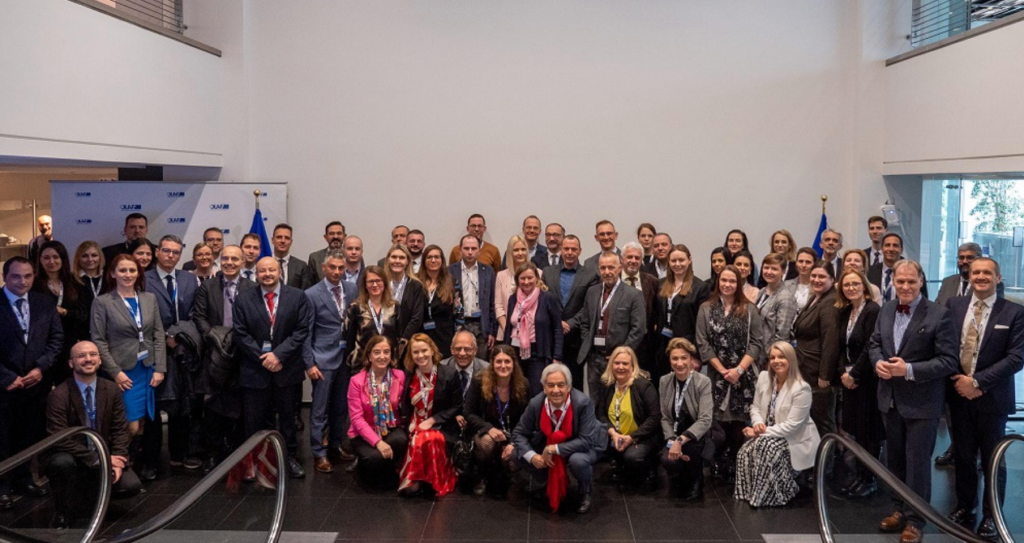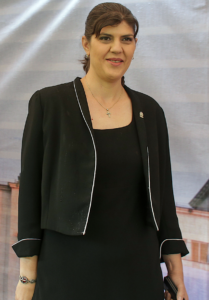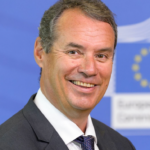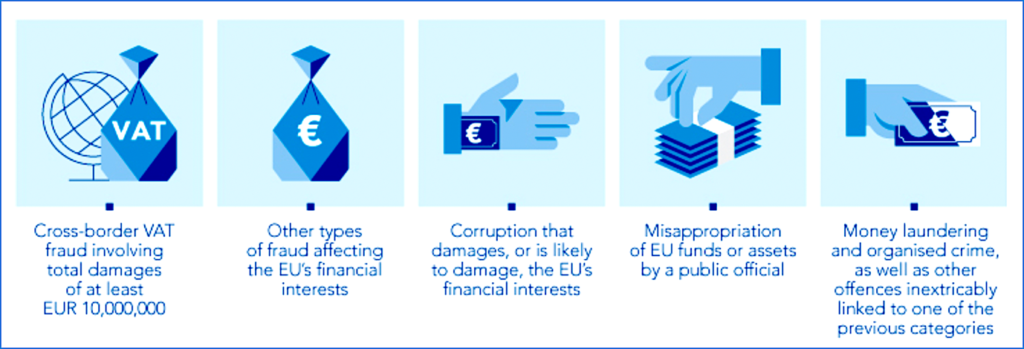The “Corrupt Legislation” mural by Elihu Vedder is a painting that depicts the negative effects of corrupt political practices on society. The mural is a part of the artwork that adorns the interior of the Library of Congress in Washington, D.C.
“Corruption, embezzlement, fraud, these are all characteristics which exist everywhere,” said Alan Greenspan, the American economist and former chair of the Federal Reserve. “It is regrettably the way human nature functions, whether we like it or not. What successful economies do is keep it to a minimum. No one has ever eliminated any of that stuff.” That does not mean, of course, that we should give up trying, because the fraudsters certainly won’t and the damage they do affects all of us, but Greenspan was right: fraud is so all-pervading that getting rid of it would be harder than eradicating the common cold. The continuing problem with fraud and its perpetrators has led Europe to set up two separate bodies, both with the inevitable acronyms as names. In this case, the letters stand for Office de Lutte Anti-Fraude. The EU (and the rest of Europe) seems very fond of acronyms. The EU has its own public prosecutor’s office, too. You will not be surprised to note that it’s called EPPO: the European Public Prosecutor’s Office.
You may think these two quite separate bodies are joined at the hip, but they’re not. They are quite separate organisations, both pledged to fighting fairly similar types of crime, and they work in accordance with an arrangement agreed between them in 2021. What this means in reality is that OLAF conducts administrative investigations, while EPPO handles criminal investigations. The two organisations co-operate a lot, as you can imagine. Their joint purpose is set out in a press release: “The common aim is to increase fraud detection at EU level, to avoid duplication, to protect the integrity and efficiency of criminal investigations and maximize the recovery of damages.”

In late March, OLAF organised its 32nd Anti-Fraud Communicators’ Network annual conference in Brussels, which brought together some 60 or so participants from around the anti-fraud community so that they could discuss best practices and talk about recent events. You will not be surprised to discover that some of the time was taken up with discussing ways to ensure the effectiveness of sanctions against Russia, as well as ensuring that Russia is not facilitating that kind of criminality. “Communication and cooperation are vital components in the fight against fraud and it is important that they take place at every level,” said Deputy Director General of OLAF Andreas Schwarz. The meeting was also a chance for participants to learn from each other which they hope will lead to more effective exchanges of messages from and among §anti-fraud organisations and institutions within the EU. That may not sound very important but it is.


Meanwhile, EPPO now has its first ever public prosecutor. The former Romanian anti-corruption official Laura Codruta Koevesi has accepted the job and looks like being a tough cookie. She will now be in charge of the new European Public Prosecutor’s Office for the next seven years. It won’t be an easy job and not one that’s likely to make her popular in some quarters (albeit fairly shady quarters). She sees a close relationship between OLAF and EPPO as vital in her fight against criminality and corruption. Ville Itälä, who is Director-General of Europe’s Anti-Fraud Office told delegates: “The working arrangement between OLAF and EPPO is an important milestone in our future relationship. It sets out in concrete terms how we will work together, based on trust and transparency.” She pointed out that speed of operation would also be essential if the criminals were to be prevented from carrying out their criminal acts and brought to book if they succeeded in their criminal endeavours. “Focusing on rapid, effective and reciprocal exchanges of information, it should ensure that no case goes undetected,” said Itälä. “It is a major part of ensuring that together we can step up the fight against fraud and corruption affecting the financial interests of the EU.” To be perfectly honest, the combined expertise of Sherlock Holmes, Hercule Poirot and Jules Maigret would be unlikely to achieve such an astounding breakthrough, but as long as the intention is there it’s a start.
For one thing, the ground rules have been set out for the two offices to exchange information, and report and transfer potential cases in each other’s investigations, with OLAF carrying out complementary investigations when required and with the two offices having regular exchanges of information so that the latest information can be passed on. There will also now be regular joint training exercises and staff exchange programmes. It’s a promising start, although it will not put an end to criminality, of course. It may make it more difficult to undertake certain crimes, with more of the participants facing the prospect of arrest, the confiscation of their assets and a spell behind bars for their trouble.

| WHO’S DOING WHAT?
It’s worth recalling the bodies’ underlying purpose: the EPPO is an independent body set up by the European Union to investigate, prosecute, and bring to judgment crimes involving the bloc’s budget. That sounds straightforward enough. These crimes can include fraud, corruption, and cross-border VAT fraud involving sums greater than 10 million euros.
The European Public Prosecutor’s Office (EPPO) recently, carried out ten searches in several locations in Belgium, including at Liège Airport, and arrested four suspects, during an operation against a customs fraud ring believed to have caused damages of up to €310 million in evaded tax and custom duties.
Previously, only national prosecutors in the 27 EU member states could do this, but they were hampered in their efforts because they lacked jurisdiction beyond their borders. Other institutions, such as Europol or the EU’s anti-fraud office OLAF, had no legal ability to act. That is changing now. As Ville Itälä pointed out, the recent (and still not fully resolved) scandal over corruption involving Qatar and the European Parliament presents an open door at which EPPO can push to gain traction and influence with little serious obstruction. MEPs, parliament officials and others want the whole mess brought out into the open and thoroughly cleaned up. EPPO has just the tools needed to do that.

Itälä wants full access to the European Parliament so that he can attend meetings set up to discuss graft and corruption. He thinks he can turn the spotlight onto improper activities. Currently, OLAF can look but not touch. He told the Politico newspaper: ““We have the access to the Commission president’s office and IT but not to MEPs. The Parliament doesn’t let us have this access.” Itälä wants that to change – and quickly. His more muscular approach to tackling the misuse of EU funds may scare some MEPs and officials but it may well be the only way to restore public confidence.
EPPO and OLAF, though similar in purpose, are not the same. For instance, OLAF has a lot of tools with which to investigate financial wrong-doing, but it cannot prosecute perpetrators; that’s the task of prosecutors appointed by participating member states. EPPO and OLAF, however, are under instruction to co-operate, with EPPO instructed to “establish and maintain a close relationship with OLAF based on mutual cooperation within their respective mandates and ‘on the exchange of information’, while OLAF is instructed to work with EPPO “to ensure the highest level of protection of the financial interests of the Union through synergies between [the EPPO and OLAF] while ensuring close cooperation, information exchange, complementarity and the avoidance of duplication.” Bearing in mind how organisations tend to guard their own turf to ensure that they and they alone have power there, that could prove the most difficult part, although awareness of that danger should go some way towards fending off the greatest risks. The rules are also fastidiously well-worded to minimise risks. Both bodies must carefully inform the relevant national authorities of any wrong-doing they uncover.

| GET OUT OF THAT, IF YOU CAN!
The drafters of the new legislation were clearly well aware of the pitfalls and potential risks and they seem to have tried to make the rules as waterproof as possible. Their aim was to make this kind of malfeasance as difficult as possible, even if nothing will ever stop determined crooks from going after the family silver. As it is, in parallel with EPPO’s criminal prosecutions, , OLAF’s financial, administrative and disciplinary recommendations will continue to promote, if possible, the recovery of EU funds that have been misappropriated through dishonest means, as well as investigating conduct that could, theoretically, adversely affect the financial interests of the five EU member states not signed up to EPPO. In other words, EPPO will nevertheless look for evidence it can place before a court in a non-participating country in order to facilitate a prosecution and the recovery of funds. It would clearly be bad for those that are participating in EPPO and OLAF if criminals could easily access dishonest funds from neighbouring EU member states. As the explanatory press release puts it: “Effective cooperation and collaboration between n the EPPO and OLAF will strengthen fight against fraud affecting the EU’s financial interests. Given the early stage of the EPPO’s operations, it remains to be seen how effectively and efficiently the offices will coordinate and cooperate in practice.”

